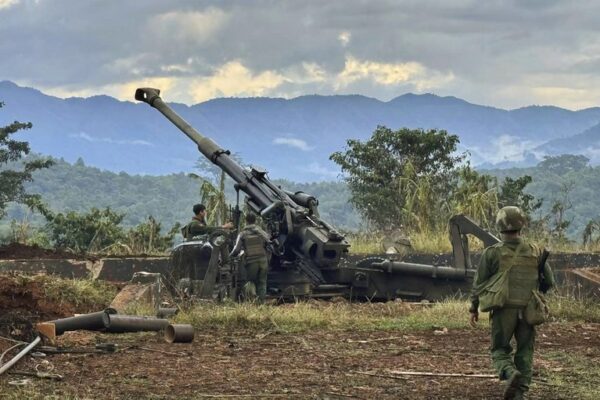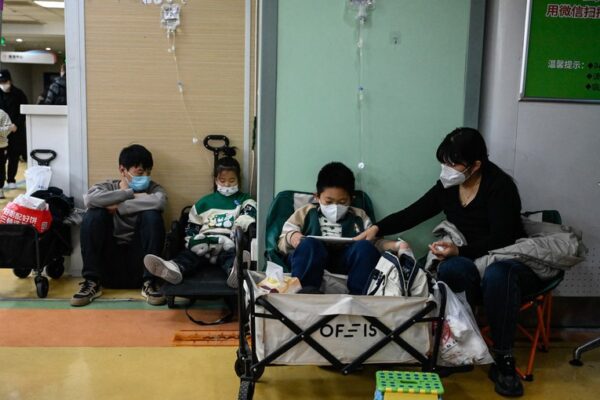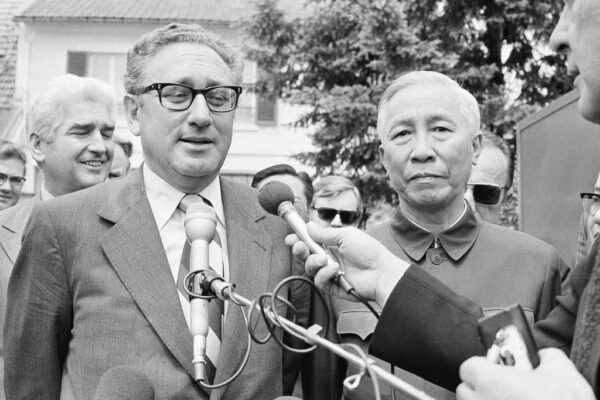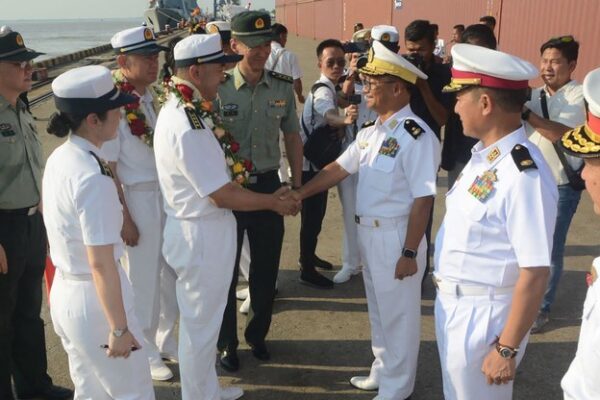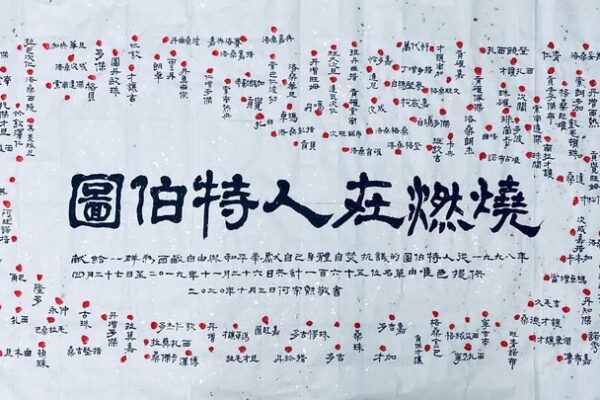
Taiwan calligraphy exhibit honors Tibetans who self-immolated
On Sunday, Tibetans around the world will be protesting outside Chinese embassies around the world to mark International Human Rights Day. There is no Chinese Embassy in democratic Taiwan, so the Dalai Lama Foundation will exhibit 166 works of calligraphy by Ho Tsung-hsun, with prayers and chants from five Buddhist teachers honoring the “heroes and martyrs” of the Tibetan resistance movement instead. The exhibit – titled “Those Who Give Fearlessly” – will honor 166 Tibetans inside and outside China who have set themselves on fire as an act of resistance to Chinese Communist Party rule, and in pursuit of freedom, Ho told Radio Free Asia in a recent interview. “I was very worried when I was doing this that people would think that I was encouraging self-immolation,” Ho said. “But these things happened – that’s a fact.” “You can’t erase an entire nationality from the historical record who have made such sacrifices in pursuit of their freedom,” he said. Ho made the exhibit not to advocate self-immolation, but to highlight the despair and helplessness of those who use it as a form of protest, he said. In 2020, Ho Tsung-hsun arranged the names of people who self-immolated around an outline of Tibet. (Provided by Ho Tsung-hsun) “Self-immolation is a last-ditch choice – there must be so much going on in people’s minds that we can’t understand,” he said. “166 self-immolations in the space of just 10 years is a shocking number.” “Cheng Nan-jung self-immolated right here in Taiwan, and we still see memorials to him here every year marking that day,” Ho said, in a reference to the 1989 self-immolation of the Taiwanese publisher, in a protest against the lack of free speech under authoritarian, one-party rule by the Kuomintang. Writing history Calligraphic inscriptions have been used since ancient times to record important events, whether on stone steles or on paper, Ho said. He hopes that his imitation of ancient scrolls will pay due respect to the people who burned in the ultimate act of self-sacrifice. Kelsang Gyaltsen, the Dalai Lama’s envoy to Taiwan, told Radio Free Asia he was moved by Ho’s tribute. “These Tibetans are heroes as we define them in Tibet,” he said. “The Chinese government demonizes them as insane, or claims they acted out of desperation due to family or economic disputes, but it’s not that. No.” “They sacrificed themselves for their country, and for their people.” Ho Tsung-hsun says Lobsang Phuntsok’s self-immolation death, the second to take place in Tibet, had a powerful effect as it occurred on Ho’s birthday. (Hsia Hsiao-Hwa) Kelsang Gyaltsen said the epithet, “Those who give fearlessly” is the highest level of almsgiving in the Buddhist tradition. “It means to give your life for a just cause,” he said. Many of those who set fire to themselves did so while shouting slogans or leaving statements calling for freedom for Tibetans, or for the return of its exiled spiritual leader, the Dalai Lama, and the protection of Tibetans’ Buddhist and cultural heritage. Some inscribed “Independence for Tibet” on their bodies, Kelsang Gyaltsen said. Anyone who claims that just speaking of the self-immolations means encouraging them is engaging in pro-Beijing “cognitive warfare,” he added. “Who is it who most wants to forget them? Who doesn’t want us to cherish or remember them? It’s the brutal Chinese Communist Party regime,” he said, calling for the anniversary of the first self-immolation – Feb. 27 – to be marked as “Tibetan Self-Immolation Day.” Art as protest Ho, who studied advertising and fine arts, started writing calligraphy in high school 40 years ago. His calligraphy has graced a number of protests over the last three decades in Taiwan, including environmental protection and anti-nuclear campaigns, educational reform movements and political activism. Ho Tsung-hsun placed images of the the tantric Buddhist deity Palden Lhamo, a protective warrior goddess also known as Shri Devi, and Nechung, a protective deity closely associated with the Dalai Lama, on his desk to help him complete the calligraphy for Namlha Tsering. (Provided by Ho Tsung-hsun) He has an abiding memory of one self-immolation – the second to take place in Tibet, in 2009 — in particular. “Lobsang Phuntsok, who was only 20 years old at the time, self-immolated on March 16, which happened to be my birthday,” Ho said. “From then onwards, it seemed as if our souls were connected, and that was when I started to pay attention and care about what was happening.” March 16 is also the anniversary of mass protests by Tibetans, including Buddhist monks and nuns in Ngaba, a Tibetan region of China’s southwestern province of Sichuan, in 2008, that were to be a turning point in the movement for a free Tibet. “I was shocked, saddened and outraged by each self-immolation, especially during the nearly 90 self-immolations that took place in 2012 – at their peak, we were seeing nearly one a week,” Ho said. Just thinking about the way Lobsang Phutsok died causes him pain to this day, he said. Ancient style Ho’s exhibit will display 166 records of self-immolation by Tibetans using paper and a calligraphic style that matches the style of ancient official records. Each piece is 34 cm long and 18.5 cm wide (13 x 7 inches). Each work shows the person’s name, place of birth, identity and age of self-immolation. Ho’s exhibit also has the blessing of the Tibetan government-in-exile’s envoy to Taiwan, who suggested he make sure Tibetans are the central subjects of the work, and add the ancient Tibetan place-names from when the region was a sovereign and independent country, alongside the modern place-names that are used under Chinese rule. One record reads: “Lobsang Tashi, a monk from Amdo in today’s Sichuan, was 24 years old when he set himself on fire on Feb. 27, 2009, to fight for the freedom of Tibetans.” Every one of the 166 self-immolators, who include elderly in their 80s, 16-year-old students, high-ranking Buddhist teachers, or Rinpoche, monks, nuns, students and women, is given equal…

